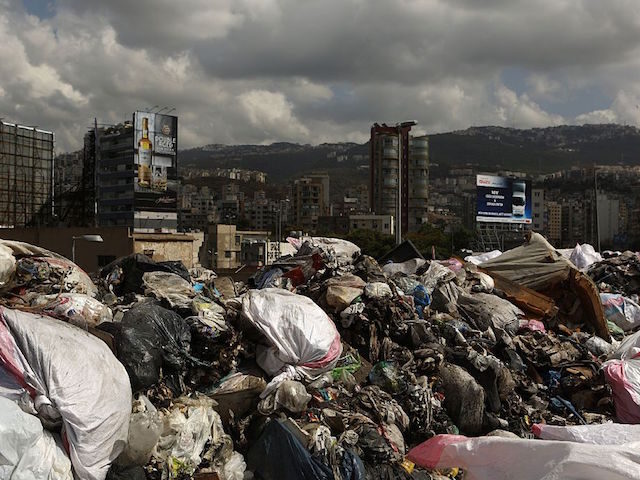In a private fundraiser speech made public in today’s release of hacked Wikileaks emails, former president Bill Clinton referred to the country of Lebanon as a positive example in the world. Lebanon, he argued, was “hanging on against all the odds” because it is a “more tolerant” society than many of its neighbors.
Lebanon has taken in over one million refugees (its total population does not exceed five million), and it has not had a president since 2014 because the Muslim-controlled Parliament has blocked a Christian from taking the post. Lebanese law requires the president to be a Maronite Christian.
Clinton’s speech is now public after being emailed to current Clinton campaign chairman John Podesta as an attachment. Wikileaks has been releasing thousands of emails hacked from Podesta’s account all month. This particular speech, at a Virginia fundraiser for the Clinton campaign, occurred behind closed doors almost exactly a year ago; it is marked “October 19, 2015.”
Clinton begins the speech by reminding listeners that the content is not for public consumption. “I think I should say, we asked people not to record this,” he begins. “It sounds like old Clinton’s in his dotage and he may say something terrible, right?”
“That’s not what’s going on,” he explains. “I just want for as long as possible for Hillary to make all the press that’s made in this campaign.”
The speech covers a variety of topics, including multiple crisis situations around the world and the domestic American economy. Clinton repeatedly asserts that the world is a mixed bag of expectations, and attempts to argue that there are reasons to be optimistic about the global advance of civilization.
“The point I want to make is we’re living in an interdependent world with positive and negative forces,” he says. “Yes, the Middle East is a mess, but the two most moderate countries – Lebanon and Jordan – are hanging on against all the odds, overwhelmed with Syrian refugees, because they are more tolerant, more open, more flexible societies, determined to try to be decent to those people and not be consumed by the challenge.”
Later in the speech, Clinton boasts that Hillary Clinton, as secretary of state, “developed a working relationship” with the Muslim Brotherhood in Egypt. “When the Muslim Brotherhood took over in Egypt, in spite of the fact that we were (inaudible), she developed a working relationship with the then-president and went there and brokered a ceasefire to stop a full-scale shooting war between Israel and Hamas in Gaza,” he says, according to the transcript.
While the description of Lebanon as “hanging on” is arguable, the tolerant nature of Lebanese politics is a difficult claim to prove. Lebanon is home to the terrorist group Hezbollah, which has representation in Parliament and controls a formidable militia independent of the Lebanese government. “Unlike other Lebanese political parties, Hezbollah is heavily armed and its military wing conducts itself much like an independent army,” the Wall Street Journal notes.
Hezbollah and militant Sunni Islamic groups were influential long before the Syrian civil war sent an influx of over a million refugees into Lebanon. The Wall Street Journal‘s profile of Lebanon notes that the growing influence of the nation’s Islamic vote has damaged the influence of the presidency: “as Lebanon’s Christians have emigrated out of the country and the Muslim population has increased, the power of the presidency has faded into a largely symbolic role.”
Lebanon last had a president in May 2014; it had been without one for over a year when President Clinton made his remarks. An agreement cemented in 1943 requires the president to be a Maronite Christian, while requiring the prime minister be a Sunni Muslim and the speaker of Parliament to be a Shiite Muslim. Because Parliament, ruled by both Sunnis and Shiites, controls the election of a president, the position has simply been left vacant, leaving Sunni Muslim Prime Minister Tammam Salam acting as president.
“It has become the butt of jokes among residents in Lebanon, who still laugh at the fact that it took less time for Brazil to bring in a Lebanese president,” the outlet Middle East Eye notes.
The Lebanese will go to the polls on October 31, hopefully concluding the period of uncertainty of the past two years. Among the many issues facing a new president will be the integration of Syrian refugees into the greater Lebanese population, particularly in light of Lebanon already being home to a number of Palestinian refugee camps, and an ongoing garbage crisis.
The paralyzed government has failed, among other things, to provide reliable waste management. As a result, the capital, Beirut, is drowning in waste, and residents are suffering from infectious diseases as a result of heaping mounds of waste being present throughout the city.
An AFP reporter visiting Beirut to photograph the piles of garbage found that residents greeted him with “enthusiasm,” “with residents eagerly ushering me onto their rooftops or near their windows to snap pictures of the piles of rubbish lining Lebanon’s roads.” They demanded the reporter show the world the horror of the waste situation in their country, and lamented that the photos could not capture the smell.

COMMENTS
Please let us know if you're having issues with commenting.